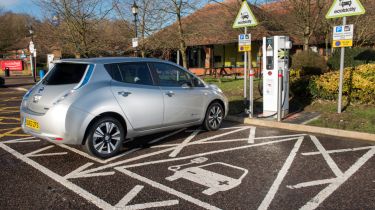UK government falls short of motorway electric car charging target
A major EV infrastructure target is missed as less than four in 10 motorway service stations have six or more rapid chargers.

As electric vehicle ownership continues to rapidly rise in the UK, infrastructure is failing to meet demand. The number of rapid or ultra-rapid electric vehicle chargers in motorway service stations has not reached targets set out by the Department for Transport that should have been met by the end of 2023.
New data from the RAC says the DfT’s own aim of equipping every motorway station with at least six rapid chargers for EVs has not been met with just 46 of 119 motorway services offering six charging stations above a speed of 50kW. The RAC also says the number of motorway rapid chargers has grown by just 19 since the end of April 2023.
The term ‘rapid and ultra-rapid chargers’ refers to units with charging speeds of between 150kW and 350kW. While the numbers of these high-spec units are lagging behind, four UK service stations still have no EV chargers of any description; Leicester Forest on both sides of the M1, Tebay South on the M6, and Barton Park on the A1(M).
EV charger mapping service Zapmap says the UK has 53,029 charging points, of which only a fifth of are rapid or ultra-rapid. The government says it is aiming for at least 300,000 public chargers by 2030.
Back in 2020 the government announced a £1bn Rapid Charging Fund as a ‘pilot scheme’ to improve the UK’s charging infrastructure. A consultation to determine which services and areas will benefit from the money will end in February 2024. More recently in December 2023, a £70m fund was allocated to help 10 motorway services install ultra-rapid charging stations as concerns have been raised around problems getting sufficient electricity supplies to these sometimes remote locations.
Want the latest car news in your inbox? Sign up to the free Auto Express email newsletter...
Find a car with the experts




